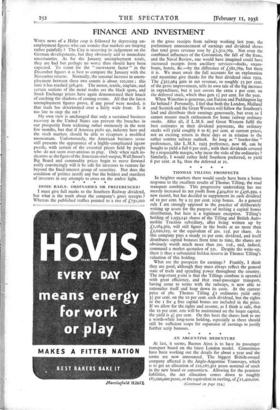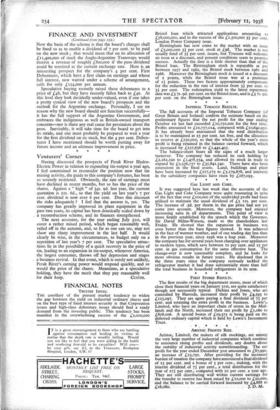AN ARGENTINE DEBENTURE
At last, it seems, Buenos Aires is to have its passenger transport board, on the latest London model. Committees have been working out the details for about a year and the terms are now announced. The biggest British-owned company affected is the Anglo-Argentine Tramways, which is to get an allocation of 210,167,301 pesos nominal of stock in the new board or consortium. Allowing for the pensions liabilities, the net allocation comes down to roughly 185,000,000 pesos, or the equivalent in sterling, of £r I,400,000.
(Confirmed on page 254.)
FINANCE AND INVESTMENT
(Continued from page 252.) Now the basis of the scheme is that the board's charges shall be fixed so as to enable a dividend of 7 per cent. to be paid on the new stock ; that would mean that on its allocation of £I1,400,000 of stock the Anglo-Argentine Tramways would receive a revenue of roughly L800,000 if the peso dividend could be remitted at the current exchange rate. Here is an interesting prospect for the company's 4 per cent. First Debentures, which have a first claim on earnings and whose full interest, now waived under a scheme of arrangement, callS for only £124,000 per annum.
Speculative buying recently raised these debentures to a price of £48, but they have recently fallen back to L40. At this level they look decidedly under-valued, even if one takes a pretty cynical view of the new board's prospects and the outlook for the Argentine exchange. Personally, I see no reason why the new board should not function successfully— it has the full support of the Argentine Government, and embraces the indigenous as well as British-owned transport concerns—nor is there any real cause for pessimism about the peso. Inevitably, it will take time for the board to get into its stride, and one must probably be prepared to wait a year for the first dividend on its stock, but the 4 per cent. Deben- tures I have mentioned should be worth putting away for future income and an ultimate improvement in price.
* * * *



















































 Previous page
Previous page